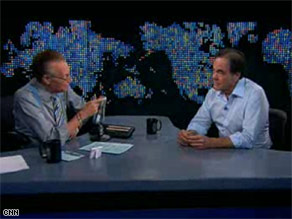
Michael Cera always seems to be pining for something: booze and a popular classmate in "Superbad"; the sly soul mate he impregnated in "Juno"; a lovely but forbidden cousin in TV's "Arrested Development."
One thing the modest, soft-spoken Cera does not pine for is celebrity, but he's got it anyway. As Hollywood's favorite awkward teen, Cera has just turned 20 with an enviable list of hits and critical favorites behind him.
He's back in full heartache mode in "Nick and Norah's Infinite Playlist," starring as a high school senior whose obsession over a shallow ex-girlfriend vanishes during an all-night romp through New York with a new dreamgirl (Kat Dennings).
With back-to-back $100 million hits in "Superbad" and "Juno," Cera has quietly jumped to the forefront of young Hollywood actors. He has two movies due out next year and another starting production soon in Toronto, near his hometown of Brampton, Ontario.
Steady, enjoyable work, not stardom and commercial success, is what he aims for, however.
"I never really had expectations either way. It doesn't matter to me. I just like the work," Cera said in an interview at the Toronto International Film Festival, where "Nick and Norah" premiered. "I like being on the set and that's what's important to me about being an actor. Things change and come and go, and whatever happens happens. As long as I like it and I'm working with people I like, I'll be happy."
"Nick and Norah" is a boy-meets-girl story that plays out over one wild night. The film opened Friday and had a successful weekend at the box office.
Cera's Nick is so smitten with his ex-girlfriend he devotes endless hours to making and packaging music compilations for her, CDs she thoughtlessly discards. But they have magically found their way to Dennings' Norah, who adores the song selections.
After Nick and Norah share a memorable introduction at a club, they wind up on a quest to find a missing drunken friend while dodging their past romantic partners, at the same time tracking the next guerrilla gig of their elusive favorite band.
It's the second all-nighter Cera has pulled on the big-screen, following last year's "Superbad," which followed the adventures of three underage pals on a hunt for alcohol.
"The one-night idea, I think it's something that people like. Whenever people go to a party or something, they're kind of hoping it will be a memorable night," Cera said. "It's a cool idea. Those nights are great when things just keep happening and leading to other things. It just feels like you're living."
Cera got into acting as a child after he and a friend enrolled in a class that taught improvisational games. One of the teachers told Cera's mother that the family should get an agent for the boy.
After doing some commercials, Cera began landing TV roles in Canada and then Hollywood, eventually winning the part of hemming-and-hawing teen George-Michael Bluth on the critically adored comedy "Arrested Development," the story of a dysfunctional rich family trying to make do after their assets are frozen.






